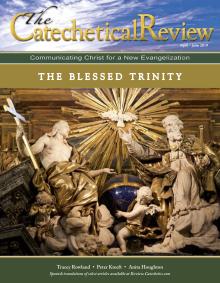The phrases “God from God” and “Light from Light” are used in the Nicene Creed which is recited at every Sunday Mass.
In Latin, the phrase “Light from Light” is lumen de lumine. The phrase appears in the very first section of the Creed:
"I believe in one God, the Father almighty, maker of heaven and earth, of all things visible and invisible. I believe in one Lord, Jesus Christ, the only begotten Son of God, born of the Father before all ages. God from God, Light from Light, true God from true God, begotten, not made, consubstantial with the Father; through him all things were made."
The Symbolum Nicaenum, or Nicene Creed, was first promulgated at the Council of Nicea (325), though in an abbreviated form from what we have today. St. Athanasius (296-373), the great bishop of Alexandria, attributes the composition of the Nicene Creed to a Papal Legate called Hossius of Cordoba. The Creed is also sometimes called the Nicene-Constantinoplian Creed since it appears in the Acts of the Council of Constantinople (381). It was formally promulgated at Chalcedon in 451 and has come down to us as our present Nicene Creed.
It was at the Councils of Nicea and Constantinople that the true nature of Jesus was defended against a multitude of heresies. In particular, the words “God from God” and “Light from Light” were aimed against the Arian heresy, which denied the pre-existence of Christ. Arius (c. 250-336), a priest from Alexandria, argued that the Father alone is God in the full sense and that the Son was a being created by the Father. This idea was also called “subordinationism.” The Councils, drawing upon the traditions handed down to them from the Apostles, condemned the heresy and declared that Jesus was indeed both true God and true man. Against Arius, the Nicene Creed reasserts the principle that Jesus Christ is not made by God and so is of the created order, but is instead of the same order of being as the Father: uncreated, eternal, and timeless. The Greek word “homo-ousios” (of the same being), or in Latin “consubstantialis” and now in the English version of the Creed “consubstantial,” was used to denote the relationship of God the Father to God the Son.
Nonetheless, Arianism remained a problem for well over a century. The whole of modern day France was infected with Arianism until King Clovis married Burgundian Princess Clotilde. In 496, Clotilde, who was not an Arian, convinced Clovis that Christ really was God. When Clovis converted to this position, some 4,000 of his soldiers followed him, and as a consequence Arianism died out in the Frankish kingdom. St. Clotilde is one of a number of saintly queens who used her influence with poorly catechised husbands to change the course of history in a decidedly Christian direction.
The rest of this online article is available for current Guild members.
This article is from The Catechetical Review (Online Edition ISSN 2379-6324) and may be copied for catechetical purposes only. It may not be reprinted in another published work without the permission of The Catechetical Review by contacting [email protected]


















